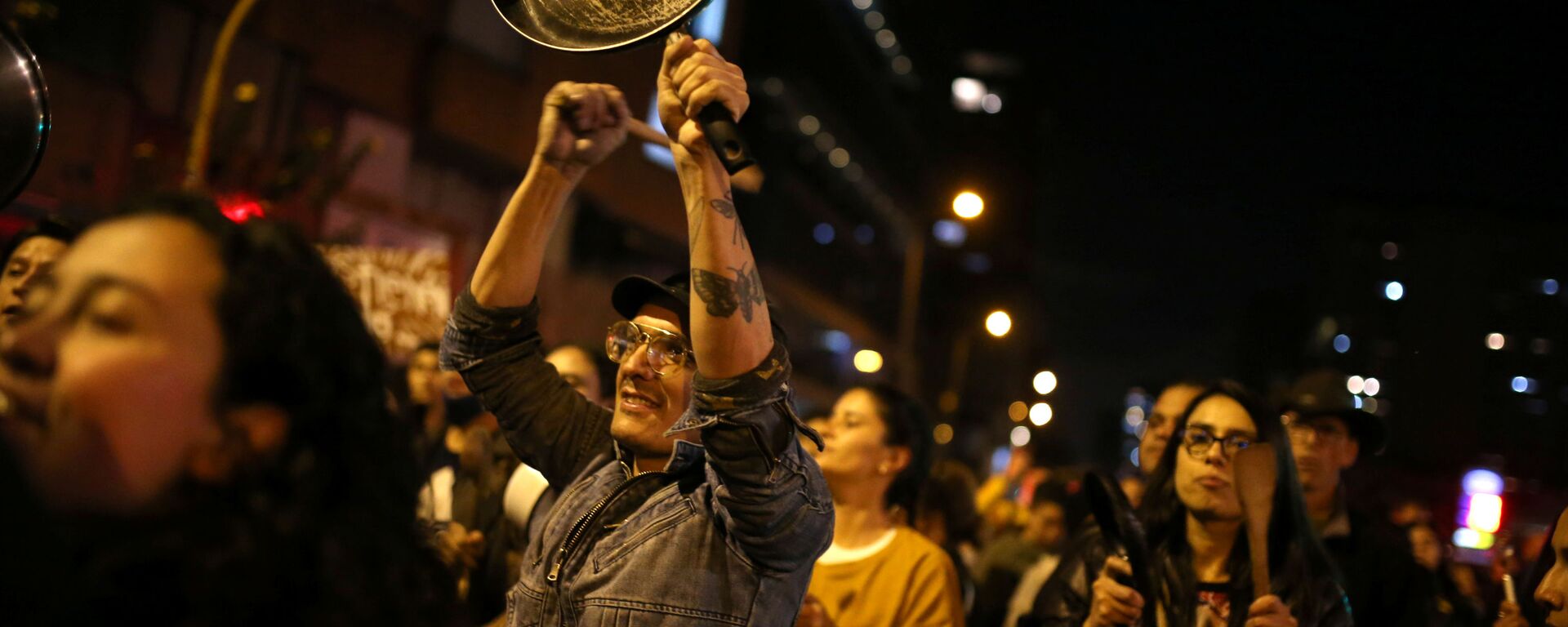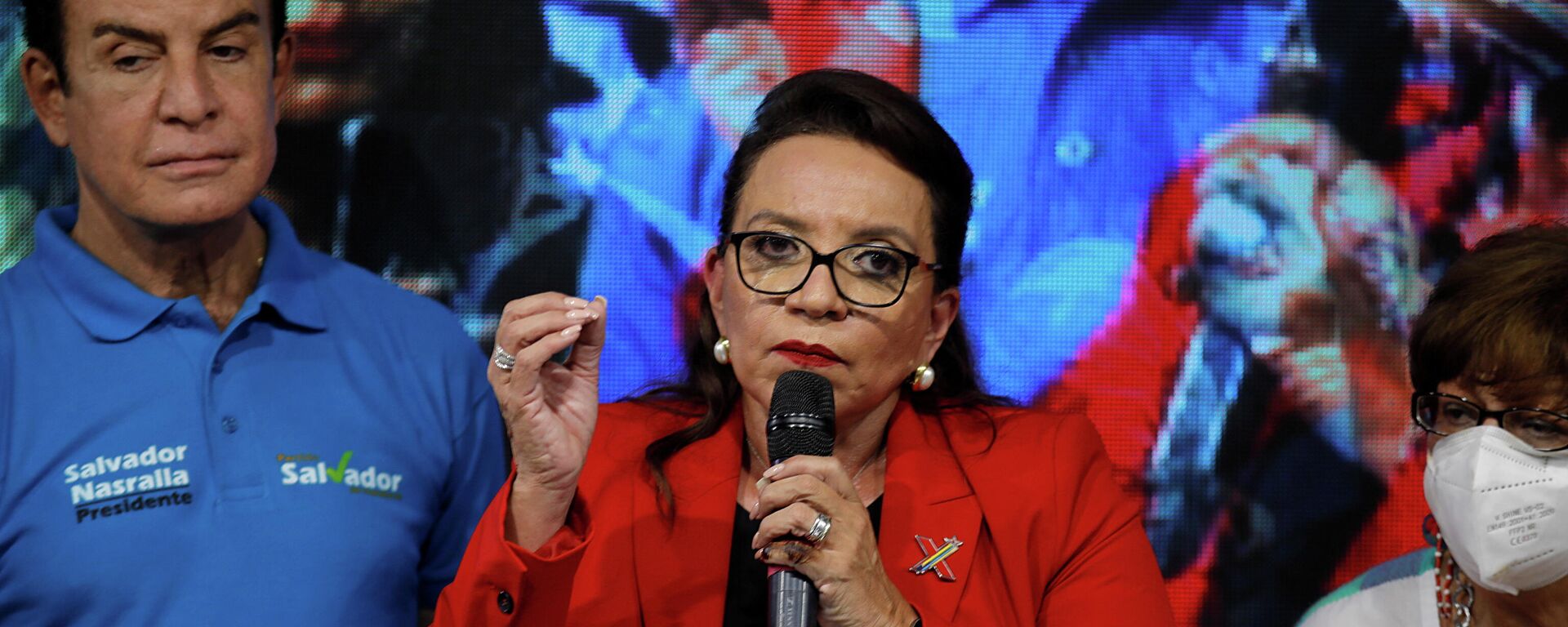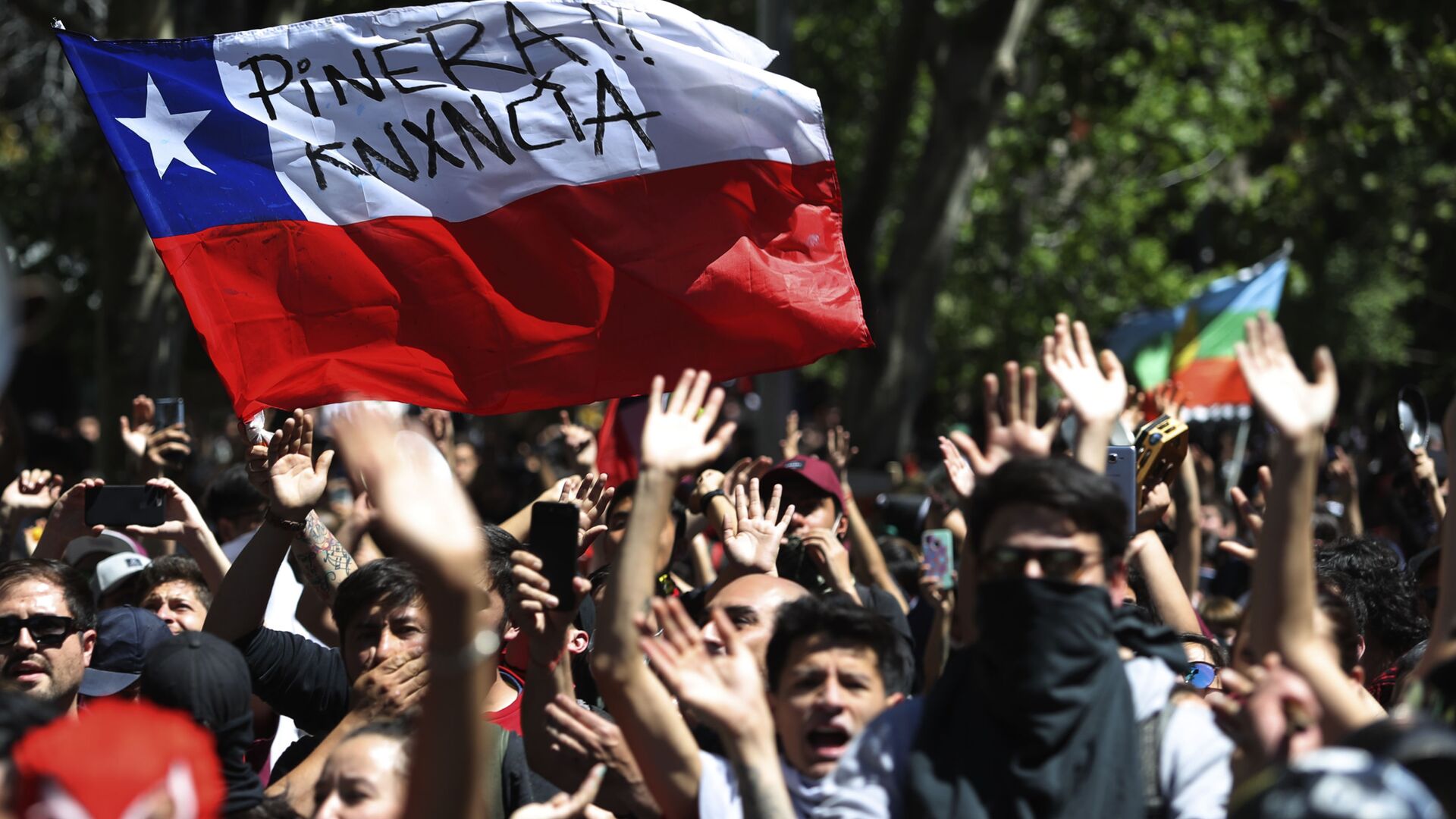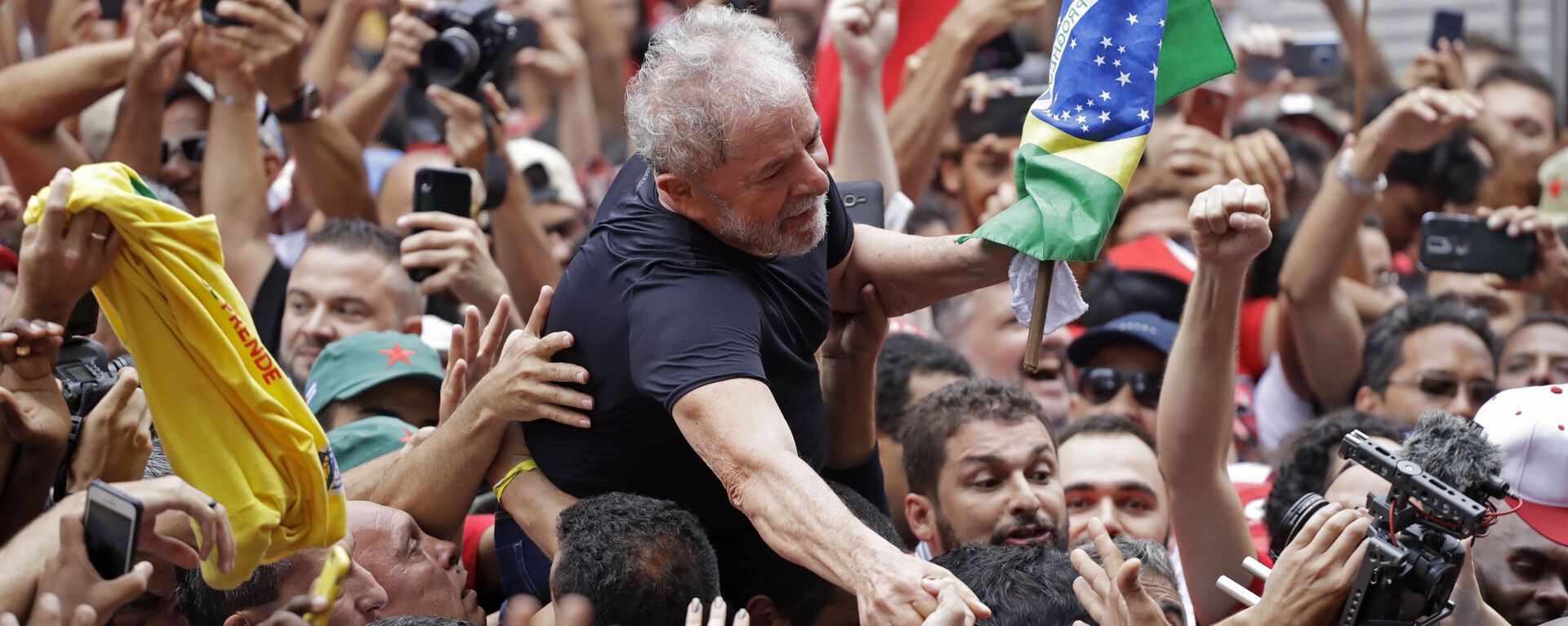https://sputnikglobe.com/20220122/a-second-pink-tide-how-argentina-brazil--chile-could-facilitate-new-south-american-union-1092453698.html
A Second 'Pink Tide'? How Argentina, Brazil & Chile Could Facilitate New South American Union
A Second 'Pink Tide'? How Argentina, Brazil & Chile Could Facilitate New South American Union
Sputnik International
Gabriel Boric's win in Chile has become yet another victory of a socialist presidential candidate in Latin America, triggering a debate about a second "Pink Tide."
2022-01-22T21:19+0000
2022-01-22T21:19+0000
2022-10-31T19:33+0000
brazil
peru
argentina
bolivia
south america
world
latin america
opinion
chile
monroe doctrine
https://cdn1.img.sputnikglobe.com/img/107711/13/1077111314_0:157:3085:1892_1920x0_80_0_0_c20065f23bea8f37f8331581fbccc63e.jpg
Chilean President-elect Gabriel Boric on 21 January announced his first cabinet, comprising 24 ministers and including Defence Minister Maya Fernandez — a granddaughter of socialist President Salvador Allende, who was overthrown by a military coup in 1973. In December 2021, Boric, 35, a left-wing politician, won the race to replace Chilean President Sebastián Piñera, receiving 56% of votes while his right-wing opponent, Jose Antonio Kast, trailed with 44%. Boric, the youngest president in the nation's history, will be inaugurated on 11 March 2022.What's Behind Boric's Win?Boric's win is highly symbolic for the region, as it sealed the ultimate failure of the neoliberalism in "the first laboratory of the Chicago School in South America," says Juan Martin Gonzalez Cabañas, an Argentine political consultant and geopolitical analyst at international think tank Vision & Global Trends.After Pinochet's CIA-backed 1973 military coup, the country embraced the junta's "market dictatorship" which was replaced by a "neoliberal democracy" in the 1990s and a "centrist consensus" between post-Pinochet conservative forces and the traditional Chilean left, according to Gonzalez Cabañas. However, this supposed "democratic consensus" didn’t change the economic, social and political structures inherited from the Pinochet dictatorship, the analyst notes.Although the Chilean economy had long been regarded as a "neoliberal model" among Latin American states, the nation found itself engulfed by protests in 2019 over huge income gaps, unequal access to health care and education, flourishing corruption and growing cost of living. The protests, known as the Estallido Social, erupted in October 2019 and continued through 2021.Left-wing politician Gabriel Boric won on promises to fight inequality, expand social rights, reform Chile's pension and health care systems, and reduce the work week from 45 to 40 hours, among other social measures.Boric's victory is preceded by the victories of other socialists; Lius Arce in Bolivia in (October 2020), Pedro Castillo in Peru (July 2021), and Xiomara Castro in Honduras (December 2021), according to Gonzalez Cabañas. Left-leaning politicians have also taken the reins in Mexico (2018) and Argentina (2019).The analyst does not rule out that the general election in Brazil scheduled for 2 October 2022, could result in a victory for former leftist President Luiz Inácio Lula da Silva, should he decide to run.The latest survey by PoderData indicated that if an election were held today, Lula would win 42% of the votes against 28% for Bolsonaro. Reuters points out that voter support for the former Brazilian president is now almost the same as the total support for all other candidates, at 45%. This means Lula could win an election in the first round by getting more than 50% of the valid votes cast, according to the media outlet.'Pink Tide' & 'ABC' ProjectA wave of victories by left-wing candidates across Latin America has sparked debate about a second "Pink Tide," according to Gonzalez Cabañas. At the same time, he laments the fact that "there is currently no regional organisation that functions as a larger institution that coordinates [these] efforts among the countries of the hemisphere."A Lula win, however, could trigger a shift from a neoliberal alignment toward the US to a "regional unity project," argues the scholar. A Latin American bloc comprising Argentina, Brazil and Chile could spearhead the change, Gonzalez Cabañas notes, adding that the Argentina-Brazil-Chile (ABC) structure was first proposed by then-Argentine President Juan Peron in the 1950s.Gonzalez Cabañas insists that the ABC project could become the basis for the formation of a South American Union, adding that this union would help consolidate regional countries and counterbalance the influence of the US and other global power players.The analyst assumes that Washington would try to throw sand in the gears of and regional left-wing government that rejects the neoliberal agenda advocated by the US for Latin America. South American countries must globally close ranks, he suggests, and coordinate their work at the level of social institutions as well as regional and international organisations, including Mercosur, the Andean Community, and UASUR (the Union of South American Nations), among other legacy entities.
https://sputnikglobe.com/20191203/protests-in-colombia-chile-show-that-neoliberal-reforms-dont-work-well-political-analyst-1077466553.html
https://sputnikglobe.com/20211201/leftist-castros-victory-in-honduras-vote-spells-end-of-us-backed-narco-politics-neoliberalism-1091158252.html
https://sputnikglobe.com/20210413/celso-amorim-lula-is-gigantic-force-in-brazil-can-boost-brics-facilitate-s-americas-integration-1082583809.html
brazil
peru
argentina
bolivia
south america
chile
Sputnik International
feedback@sputniknews.com
+74956456601
MIA „Rossiya Segodnya“
2022
News
en_EN
Sputnik International
feedback@sputniknews.com
+74956456601
MIA „Rossiya Segodnya“
Sputnik International
feedback@sputniknews.com
+74956456601
MIA „Rossiya Segodnya“
latin america, failure of neoliberal reforms, chilean protests, 2022 general elections in brazil, former brazilian president lula, pink tide, left-wing governments in south america
latin america, failure of neoliberal reforms, chilean protests, 2022 general elections in brazil, former brazilian president lula, pink tide, left-wing governments in south america
A Second 'Pink Tide'? How Argentina, Brazil & Chile Could Facilitate New South American Union
21:19 GMT 22.01.2022 (Updated: 19:33 GMT 31.10.2022) Gabriel Boric's victory in Chile has coincided with a string of election wins by left-wing presidential candidates across the continent, notes geopolitical analyst and scholar Juan Martin Gonzalez Cabañas, suggesting that a win by Luiz Inácio Lula da Silva in Brazil could facilitate a deeper regional consolidation.
Chilean President-elect Gabriel Boric on 21 January announced his first cabinet, comprising 24 ministers and including Defence Minister Maya Fernandez — a granddaughter of socialist President Salvador Allende, who was overthrown by a military coup in 1973.
In December 2021, Boric, 35, a left-wing politician, won the race to replace Chilean President Sebastián Piñera, receiving 56% of votes while his right-wing opponent, Jose Antonio Kast, trailed with 44%. Boric, the youngest president in the nation's history, will be inaugurated on 11 March 2022.
What's Behind Boric's Win?
Boric's win is highly symbolic for the region, as it sealed
the ultimate failure of the neoliberalism in "the first laboratory of the Chicago School in South America," says Juan Martin Gonzalez Cabañas, an Argentine political consultant and geopolitical analyst at international think tank Vision & Global Trends.
After Pinochet's CIA-backed 1973 military coup, the country embraced the junta's "market dictatorship" which was replaced by a "neoliberal democracy" in the 1990s and a "centrist consensus" between post-Pinochet conservative forces and the traditional Chilean left, according to Gonzalez Cabañas. However, this supposed "democratic consensus" didn’t change the economic, social and political structures inherited from the Pinochet dictatorship, the analyst notes.

3 December 2019, 05:43 GMT
Although the Chilean economy
had long been regarded as a "neoliberal model" among Latin American states, the nation found itself engulfed by protests in 2019 over huge income gaps, unequal access to health care and education, flourishing corruption and growing cost of living. The protests, known as the Estallido Social, erupted in October 2019 and continued through 2021.
Left-wing politician Gabriel Boric won on promises to fight inequality, expand social rights, reform Chile's pension and health care systems, and reduce the work week from 45 to 40 hours, among other social measures.
Boric's victory is preceded by the victories of other socialists; Lius Arce in Bolivia in (October 2020), Pedro Castillo in Peru (July 2021), and Xiomara Castro in Honduras (December 2021), according to Gonzalez Cabañas. Left-leaning politicians have also taken the reins in Mexico (2018) and Argentina (2019).

1 December 2021, 01:02 GMT
The analyst does not rule out that the general election in Brazil scheduled for 2 October 2022, could result in a victory for former leftist President Luiz Inácio Lula da Silva, should he decide to run.
The latest survey by PoderData indicated that if an election were held today, Lula would win 42% of the votes against 28% for Bolsonaro. Reuters
points out that voter support for the former Brazilian president is now almost the same as the total support for all other candidates, at 45%. This means Lula could win an election in the first round by getting more than 50% of the valid votes cast, according to the media outlet.
'Pink Tide' & 'ABC' Project
A wave of victories by left-wing candidates across Latin America has sparked debate about a second "Pink Tide," according to Gonzalez Cabañas. At the same time, he laments the fact that "there is currently no regional organisation that functions as a larger institution that coordinates [these] efforts among the countries of the hemisphere."
A Lula win, however, could trigger a shift from a neoliberal alignment toward the US to a "regional unity project," argues the scholar. A Latin American bloc comprising Argentina, Brazil and Chile could spearhead the change, Gonzalez Cabañas notes, adding that the Argentina-Brazil-Chile (ABC) structure was first proposed by then-Argentine President Juan Peron in the 1950s.
"Brazil and Argentina have always been the most diplomatically and culturally influential countries, economic powerhouses and large geopolitical and military units in South America which have always set a trend in the region," says the analyst. "Chile has historically been one of the most stable countries in the region. Chile could serve as a nexus between Argentina and Brazil towards the Pacific."
Gonzalez Cabañas insists that the ABC project could become the basis for the formation of a South American Union, adding that this union would help consolidate regional countries and counterbalance the influence of the US and other global power players.
The analyst assumes that Washington would try to throw sand in the gears of and regional left-wing government that rejects the neoliberal agenda advocated by the US for Latin America. South American countries must globally close ranks, he suggests, and coordinate their work at the level of social institutions as well as regional and international organisations, including Mercosur, the Andean Community, and UASUR (the Union of South American Nations), among other legacy entities.





